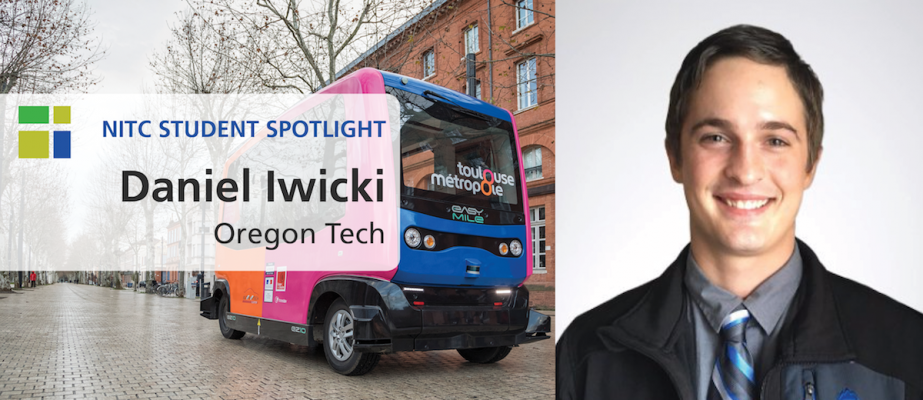Student Spotlight: Daniel Iwicki, Oregon Institute of Technology

Daniel Iwicki, Oregon Institute of Technology
Daniel Iwicki is a civil engineering student and Oregon Tech's ASCE-AGC Student Chapter President. He won a nationwide essay competition in 2018 related to effects of autonomous vehicles on rural areas and was invited to present his work at the National Conference on Rural Public and Intercity Bus Transportation. Daniel has been a NITC Scholar and has represented Oregon Tech and NITC at several events including the TRB Annual Meeting.
LinkedIn | Oregon Tech Profile
Tell us about yourself?
I am a senior civil engineering student at Oregon Institute of Technology. Born and raised in the suburbs of Chicago, I moved out to Oregon to finish school in 2016. Before arriving at Oregon Tech I wanted to build bridges; I quickly found out that transportation was more my passion. During my first summer in Oregon, I worked as a research assistant on a NITC-funded project and was a co-author for a study on vibration modal analysis of bridges titles Development of RDSETGO: A Rapidly Deployable Structural Evaluation Toolkit for Global Observation. The following school year I took on the role as president for the ASCE-AGC student chapter, focused on growing the club and outreach to younger students. That same year my interest in autonomous vehicles grew and I won a national essay competition for the National Conference on Rural Public and Intercity Bus Transportation writing on "The Effects of Autonomous Vehicles on Rural Areas." Outside of studies and work I enjoy being exploring outside (hiking and biking) and watching sports (go Cubs!).
What (or who) has influenced your career path in transportation?
I would credit my dad for getting me interested in civil engineering. He was a carpenter and working with him periodically growing up always fascinated me, leading me to my interest in mathematics and problem solving. However, before coming to Oregon Tech I thought civil engineering was exclusively structural engineering. My appreciation for transportation stems from my professor, Dr. Roger Lindgren, and the first class in transportation I took with him. His passion for the subject was contagious. Transportation is now my passion because of its impact on people and the changes that are coming to transportation through data and technology, such as ITS, autonomous vehicles, and smart cities.
You were invited to present your work on AVs at the National Conference on Rural Public and Intercity Bus Transportation. Tell us about that work?
Since becoming interested in transportation, autonomous vehicles (AV's) have been captivating. It is easy to think about the vehicle itself as an idea but the effect that autonomous vehicles will have on transportation and our everyday life is less clear. In my essay for the National Conference on Rural Public and Intercity Bus Transportation, I focused on a time when only autonomous vehicles will use the roadways. The paper discusses how the stress of driving will be reduced, potential for more urban sprawl, positive effects on the environment, and a few potential negatives. A world with AV's opens up the possibility for newly designed cities, breaking the mold of a typical city grid layout. This overall will lead to new ways of connectivity, fewer roads, and a more efficient network. However, less stress and more efficient roadways will lead to more travelling and more wear on the roadways. The increase in maintenance and replacement of roadways could have a negative effect on the environment from the increased manufacturing of hot mix asphalts and concrete. It could also have negative effect on social aspects. There will be more free time while driving. What are people going to do with this newfound time? There are so many possibilities on how AV's will affect our society, many of those possibly negatives that we cannot yet foresee.
After graduation, what future work do you envision doing in transportation?
After graduation, I am going to work for Kimley-Horn in Tucson, Arizona. I hope to stay involved with my student chapters and a professional society, either ASCE or ITE. In addition, I hope to get involved more at TRB. After attending it twice as a student, being on a committee would be a great experience; maybe one for policy on AV's. I hope to take what I have learned and help to create safer, more efficient and sustainable infrastructure.
This is an installment in a series of monthly Student Spotlights we'll be shining on students and alumni that are involved with National Institute for Transportation & Communites (NITC) universities. NITC is a university transportation consortium funded by the U.S. DOT, and is a Portland State-led partnership with the University of Oregon, Oregon Institute of Technology, University of Utah, University of Arizona, and University of Texas at Arlington.
